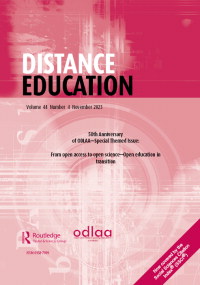Online physics laboratory course: United Kingdom Professional Standards Framework perspective from Walailak University, Thailand
IF 3.7
1区 教育学
Q1 EDUCATION & EDUCATIONAL RESEARCH
引用次数: 0
Abstract
This paper describes a case study of an online physics laboratory course implemented for 254 engineering students at Walailak University in Thailand in response to the COVID-19 pandemic. The laboratory sequence was designed based on the United Kingdom Professional Standards Framework and covered eight experiments on fundamental concepts of motion, electricity, waves, and fluid mechanics. The experiments were conducted at students' homes using physics education technology simulations, Tracker for video analysis, smartphones, and home-based apparatuses. During the experiments, students shared their progress with classmates and lecturers through screen sharing, which facilitated exchanges of ideas and difficulties. The paper discusses the successful implementation of the online laboratory course and the challenges encountered, such as student engagement, resource limitations, and practical skill development. The insights gained from this case study may be useful for online laboratory education beyond the pandemic. [ FROM AUTHOR] Copyright of Distance Education is the property of Routledge and its content may not be copied or emailed to multiple sites or posted to a listserv without the copyright holder's express written permission. However, users may print, download, or email articles for individual use. This may be abridged. No warranty is given about the accuracy of the copy. Users should refer to the original published version of the material for the full . (Copyright applies to all s.)在线物理实验课程:泰国Walailak大学的英国专业标准框架视角
本文描述了为应对新冠肺炎大流行,为泰国Walailak大学254名工程系学生实施的在线物理实验室课程的案例研究。实验室序列是根据英国专业标准框架设计的,涵盖了运动、电学、波浪和流体力学基本概念的八个实验。实验在学生家中进行,使用物理教育技术模拟、视频分析跟踪器、智能手机和家庭设备。在实验过程中,学生们通过屏幕分享与同学和讲师分享他们的进展,这有助于交流想法和困难。本文讨论了在线实验室课程的成功实施以及所遇到的挑战,如学生参与度、资源限制和实践技能发展。从这一案例研究中获得的见解可能对疫情后的在线实验室教育有用。[发件人]远程教育版权归Routledge所有,未经版权持有人明确书面许可,不得将其内容复制或通过电子邮件发送到多个网站或发布到listserv。但是,用户可以打印、下载或通过电子邮件发送文章供个人使用。这可能会被删节。对复印件的准确性不作任何保证。用户应参考材料的原始发布版本以获取完整信息。(版权适用于所有人。)
本文章由计算机程序翻译,如有差异,请以英文原文为准。
求助全文
约1分钟内获得全文
求助全文
来源期刊

Distance Education
EDUCATION & EDUCATIONAL RESEARCH-
CiteScore
10.70
自引率
6.80%
发文量
29
期刊介绍:
Distance Education, a peer-reviewed journal affiliated with the Open and Distance Learning Association of Australia, Inc., is dedicated to publishing research and scholarly content in the realm of open, distance, and flexible education. Focusing on the freedom of learners from constraints in time, pace, and place of study, the journal has been a pioneering source in these educational domains. It continues to contribute original and scholarly work, playing a crucial role in advancing knowledge and practice in open and distance learning.
 求助内容:
求助内容: 应助结果提醒方式:
应助结果提醒方式:


